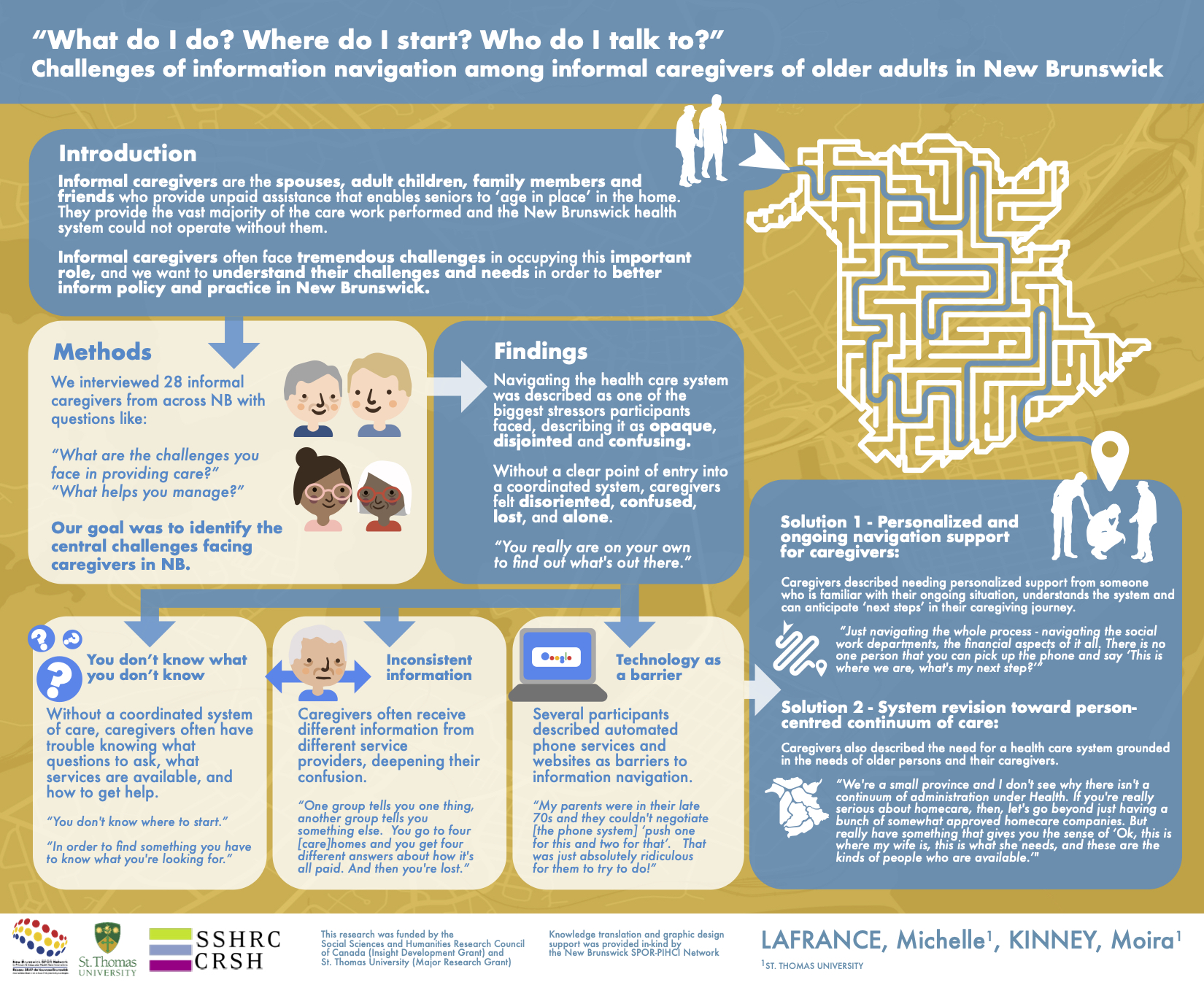Informal Caregivers
Project Summary
Informal caregivers are the “backbone of the health and long-term care system in Canada” (Canadian Healthcare Association, 2009, p. 63). The Canadian Caregiver Coalition (2015) reports that over a quarter of the Canadian population (28%) provides care to family members. Without informal caregivers, our health care system could not operate (Wiles, 2003). However, the number of individuals available to provide such care is on a sharp decline due to recent demographic shifts, including declining family size, higher divorce rates, and increased geographical dispersion of families (Roth et al., 2015). Researchers are forewarning that the breakdown of this important infrastructure is at a precarious juncture (Roth et. al., 2015). An additional issue of concern is that caregiving responsibilities can take a toll on informal caregivers’ well-being (Turcotte, 2013). The impact of the COVID-19 pandemic also demonstrated that the system at large is failing our seniors, the contribution of informal caregivers is more vital than ever, and the challenges they face are considerable.
The purpose of this research is to examine the experiences of informal caregivers in New Brunswick with a view to contributing to the scholarship in the critical social sciences, and to providing evidence-based recommendations for policy and practice in the province. Given that age-related needs are the single most common issue requiring help from informal caregivers in Canada (Sinha, 2013), and that New Brunswick has one of the oldest populations in Canada (Statistics Canada, 2017), this research focuses on those providing care to older adults (ages 65+).
Both Anglophone and Francophone informal caregivers were interviewed for this study. The Psycho-Social Ethnography of the Commonplace (P-SEC; Gouliquer & Poulin, 2005) was used because it is a purposefully interdisciplinary methodology. This methodology allows for a deeper understanding of intersecting influences of the social, cultural, organisational, political and ideological contexts of marginalised individuals’ (i.e., informal caregivers’) lives. In this research, we examine the experiences of informal caregivers with a view to uncovering the complications informal caregivers face as a result of these influences. We also explore coping strategies and resilience in this group. By using the P-SEC framework, we aim to provide evidence-based recommendations for social, political and policy changes, both at the provincial level and beyond to improve caregivers’ daily experience and thus the lives of those they care for. Findings will elucidate experiences of caregiving in New Brunswick. Furthermore, this study examines the caregiving experience in relation to language (Anglophone/Francophone), and in the contexts of both rural and urban environments.
References
Canadian Healthcare Association. (2009). Home care in Canada: From the margins to the mainstream. Ottawa: Author. Retrieved from http://www.healthcarecan.ca/wp-content/themes/camyno/assets/document/PolicyDocs/2009/External/EN/HomeCareCanada_MarginsMainstream_EN.pdf
Canadian Caregiver Coalition (2015, March). Beyond recognition – Caregiving & human rights in Canada: A policy brief. Health and social services centre. Retrieved from http://www.carerscanada.ca/wp-content/uploads/2016/02/CCC_Policy_brief_Human_rights_EN.pdf
Gouliquer, L., & Poulin, C. (2005). For better and for worse: Psychological demands and structural impacts of the military on gay servicewomen and their partners in long-term relationships. In D. Pawluch, W. Shaffir, & C. Miall (Eds.), Doing ethnography: Studying everyday life. (pp. 323-335). Toronto: Canadian Scholars’ Press Inc.
Roth, D. L., Fredman, L., & Haley, W. E. (2015). Informal caregiving and its impact on health: A reappraisal from population-based studies. The Gerontologist, 55(2), 309-319. doi: 10.1093/geront/gnu177
Sinha, M. (2013). Portrait of Caregivers, 2012. Spotlight on Canadians: Results from the General Social Survey. Statistics Canada. Catalogue no. 89‐652‐X — No. 001. ISBN 978‐1‐100‐22502‐9.
Statistics Canada. (2017a). Relationship between population growth and aging for various regions in Canada (table). 2016 census of population. Retrieved from http://www12.statcan.gc.ca/census-recensement/2016/dp-pd/dv-vd/scatterplot-diagrammededispersion/index-en.html
Turcotte, M. (2013). Family caregiving: What are the consequences? (Catalogue no. 75-006-X). Retrieved from Statistics Canada website http://www.statcan.gc.ca/pub/75-006-x/2013001/article/11858-eng.pdf
Wiles, J. (2003). Informal caregivers’ experiences of formal support in a changing context. Health and Social Care in the Community, 11(3), 189-207. doi: 10.1046/j.1365-2524.2003.00419.x

Purpose and Importance
of this Study
To deepen understanding of the challenges faced by caregivers, as well as their resilience by integrating the intersecting influences of the individual, social, cultural, organisational, political and ideological context of their lives.
To offer timely contributions to the critical social science literature on caregivers’ experiences, challenges, and resilience.
To provide evidence-based recommendations to policy makers, community groups, decision-makers in the province, and caregivers themselves.
To foster public dialogue about the important, but often-invisible work of informal caregivers, and to mobilise for change to better support them.
Support for this Study








